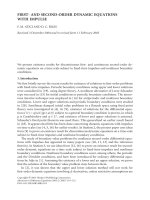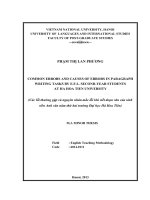Thermodynamics (first and second laws) in dyeings
Bạn đang xem bản rút gọn của tài liệu. Xem và tải ngay bản đầy đủ của tài liệu tại đây (963.81 KB, 11 trang )
Thermodynamics (first
and second laws)
By
Aravin Prince.P,
First- M.Tech- Textile Tech,
KCT.
Introduction of first law
It is a subject dealt with volume, pressure, temperature,
and concentration and with the relationships between
them
The first law prediction is however concern only the
difference between the “ initial and final states” of the
change in the internal energy.
In dyeing is involving with the color physics like which
dye is adsorbed from solution by a substrate, but only
with the end product.
Contd…
The first law of thermodynamics is dealt
with three fundamental concepts namely
“Energy, Work & Heat” and relationship
among them.
Energy
Thermodynamics is concerned with “
internal energy
U” ,
that is energy acquired by means of the mass and
motions of molecules , intermolecular forces and
chemical compositions.
The energy equation is
∆
U=U
2
-U
1
Where ,
∆
U= Total energy
U1 =Initial value of the internal energy system
U2 =Final value of the internal energy system
Work
Work may be defined as the energy lost from
the system other than by heat transfer
Basically work is known as pressure- volume
or PV work
Volume change is represent by ∆V, then the
work done is given by
W=p ∆V
First law derivation
The first principle of thermodynamics
states that the internal energy E of the
system is closed. i.e it cannot exchange
material with an external environment, it
is defined as follows
∆E=q-w
Q= heat absorbed by the system
W= work done of the system
At the constant volume the work of expansion is zero and so
∆E=q
At constant pressure work is
w=P. ∆V
Then the heat is equal
∆E+P. ∆V
Normally the reaction heat in these conditions is given the name
of enthalpy or thermic content (represented by H), then the
equ ,
∆H= ∆E+P. ∆Vq
Thermodynamics reminds us that the enthalpy of a reaction is
∆H=H
products
-H
dyes
∆H value is –ve = reaction is exothermic
∆H value is +ve = reaction is endothermic
Second law of thermodynamics
It is defined as a spontaneous process in an isolated
system there is an increase in entropy ; the entropy
change occurring during the process, ∆S is positive
Then the equ
dq (rev)
dS=
T
Q= heat absorbed
T= Temp of the system
And for irreversible spontaneous process
dq (irrev)
dS >
T
THANKYOU!!!!









